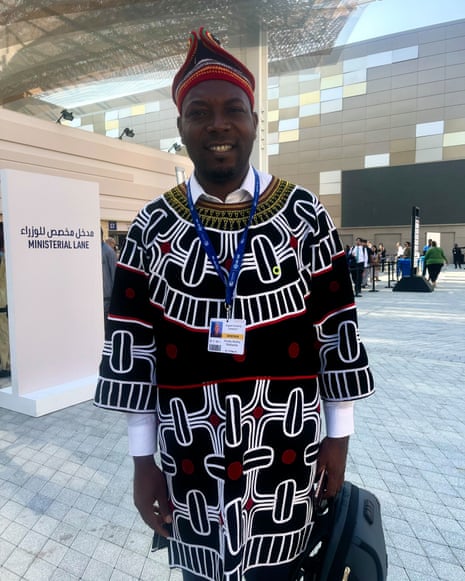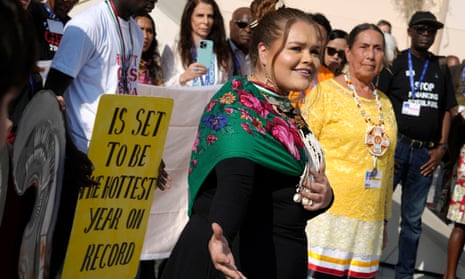‘The science compels: phase out fossil fuels’: Mary Robinson responds after Cop28 row
Damian Carrington
Mary Robinson has made her first comment since the row over the Cop28 president’s controversial and ill-tempered response to her questions on the need for a fossil fuel phase out, revealed by the Guardian.
Robinson, chair of the Elders and a former president of the Republic of Ireland, has taken a diplomatic approach, as perhaps befits a former UN climate change envoy. She does not name Sultan Al Jaber, who had told her a fossil fuel phase-out could mean “going back into caves”.
“A successful Cop28 is not about a single individual or nation, but the collective will and concerted efforts of all countries in these negotiations,” Robinson posted on X. “The science compels: phase out fossil fuels rapidly, accelerate renewable energy adoption, and radically scaled up finance.”
Al Jaber was forced to fiercely defend his respect for climate science on Monday, having told Robinson on 21 November that there was “no science out there, or no scenario out there, that says that the phase-out of fossil fuel is what’s going to achieve 1.5C”, a view strongly rejected by many scientists.
Mohamed Adow, director of Power Shift Africa, remained unimpressed:
“It’s clear that the comments by Al Jaber were a moment where the mask slipped and all his warm words about being a climate champion were revealed as greenwashing. When someone shows you what they are, we should believe them. He showed that when pushed, he lashed out with the climate denial lines proposed by the fossil fuel industry for years.”
“This Cop will be remembered for one thing: whether or not we get a fossil fuel phase-out date agreed or whether we don’t,” Adow said. “Actions speak louder than words and if we don’t get that phase out date, this Cop will be remembered as the one that was overseen by an oil baron.”
The former US vice president Al Gore was also outspoken, telling the New York Times:
“From the moment this absurd masquerade began, it was only a matter of time before [Al Jaber’s] preposterous disguise no longer concealed the reality of the most brazen conflict of interest in the history of climate negotiations. Obviously, the world needs to phase out fossil fuels as quickly as possible.”
Al Jaber is also CEO of the UAE’s state oil company. Gore said Al Jaber “has been preparing one of the most aggressive expansions of fossil fuel production, timed to begin as soon as he bangs the final gavel to conclude Cop28”.
The US climate envoy John Kerry, who is still involved in the Cop28 negotiations and has previously supported Al Jaber, remained diplomatic. He told Politico that Al Jaber’s “no science” comment may require “clarification”. Kerry said: “Maybe it came out the wrong way. Look, he’s gotta decide how he wants to phrase it, but the bottom line is this Cop needs to be committed to phasing out all unabated fossil fuel.” More than 100 countries are calling for that commitment.
Key events
Sultan Al Jaber could be president of Cop29 as well

Damian Carrington
Sultan Al Jaber, CEO of the UAE’s state oil company, has certainly been a controversial choice as president of the Cop28 climate summit. Normally, he would have one go, then the summit moves on to the next region, to be hosted by another nation and a new president from that country.

But Russia’s war in Ukraine means Al Jaber could well be the man in charge next year as well, as Simon Evans at Carbon Brief explains.
#COP28 is due to choose the host & presidency of #COP29 next year
Host is due to be from Eastern Europe, but Russia is vetoing EU, Armenia & Azerbaijan are vetoing each other…
Per UNFCCC rules:
If no-one is chosen, it will be held in Bonn, with UAE’s Al Jaber as president
— Simon Evans (@DrSimEvans) December 4, 2023
It is the turn of Eastern Europe to host the next Cop, but Russia is vetoing the 27 EU nations, and Armenia and Azerbaijan are vetoing each other. That leaves only seven, mostly small states, and putting on a Cop is very expensive.
As Evans explains, the UN rules of procedure are clear: Bonn, in Germany, and the sites of the UN climate secretariat is the default location and, if no new president is elected, it will be Al Jaber presiding at Cop29. Those who attended Cop23, which only just squeezed into the small German town in 2017, will wonder how it will cope with much higher number of attendees expected next year. Delegates will also have views on a second Cop run by Al Jaber.

Patrick Greenfield
Three more governments have signed carbon credit deals with the UAE-based firm Blue Carbon on the sidelines of Cop28, as an expert warns formal negotiations could open up the Paris agreement to “carbon cowboys”, writes my colleague Patrick Greenfield.
Comoros, Dominica and the Bahamas have become the latest countries to reach agreements with Blue Carbon, a company backed by a young Dubai royal which has overseen a series of carbon offsetting deals that cover an enormous area of African forest.
Sheikh Ahmed Dalmook al-Maktoum, the Dubai royal behind the firm, has so far overseen deals that cover a fifth of Zimbabwe, 10% of Liberia, 10% of Zambia, 8% of Tanzania and “millions” of hectares of Kenya, collectively amounting to an area larger than the size of the UK.
Under the agreements, Blue Carbon will develop climate change mitigation projects using the countries’ forest, coastlines and natural resources, selling the resulting carbon reductions and removals as credits.
Ahead of Cop28, concerns were raised about the Blue Carbon agreements, as well as about the sheikh’s previous business ventures.
At the summit, governments are negotiating how countries could use these credits towards their own national targets.
Draft text on article 6.2 of the Paris agreement, which covers country to country agreements on carbon trading, proposes that governments should be allowed to unilaterally approve credits for sale. .
“The proposed inclusion of unilateral Article 6.2 deals could open the way for unfettered “carbon cowboyism”,” said Axel Michaelowa, a carbon markets expert at the University of Zurich.
Blue Carbon has previously said its “vision with these projects is not only to accelerate global climate action but also to tackle crucial environmental challenges at the local level thereby ushering in community benefits and advancing sustainable development in the countries involved”.
Alok Sharma, an MP for the Conservative party in Britain and president of Cop26 that was held in Glasgow two years ago, has made some comments about Al Jaber’s presidency: “everyone should be questioned,” he says.
The President of Cop26 in UK, @AlokSharma_RDG on criticism of #COP28UEA presidency: “You need to judge every Cop Presidency on the outcomes … The UK faced criticisms going in to our Cop too. That’s right – everyone should be questioned.”
— Damian Carrington (@dpcarrington) December 5, 2023

Patrick Greenfield

Environment ministers from Germany and Colombia have led an open letter calling for the inclusion of nature in the global stocktake outcome, which countries are negotiating at Cop28.
The GST is a key part of the Paris agreement as it sets direction of travel for the next round of national plans for limiting global heating: should it include a phase out of fossil fuels? How much should we scale up renewables? What about subsidies?
Susana Muhamad and Steffi Lemke, Colombia and Germany’s environment ministers, say it must include language on nature and how it can be used to mitigate global warming.
Nature-based solutions is an umbrella term for using the power of nature to mitigate the impact of climate change while benefiting biodiversity and human wellbeing. Scientists say they are a cheap and underused option for protecting humanity from the environmental crises of the 21st century.
The letter underscores that the climate and biodiversity efforts, agreed at last year’s nature-focused Cop15 in Montreal, can be intertwined, producing wins for both.
“The GST provides a critical moment to recognize the importance of just and inclusive means of implementation, and address the significant finance gap for nature-based solutions,” said Muhamad. “In particular, the involvement and respect for the rights of Indigenous Peoples and local communities is critical, in addition to the urgent need to align financial flows to enable the transformations required to deliver the Paris Agreement goals.”
For those a bit unclear on exactly what a global stocktake is, or why it matters, here is a short explainer from our environment editor Fiona Harvey, as part of her very useful jargon-busting guide to Cop28.
Global stocktake
Under the Paris agreement, nations are required to measure the progress made towards the emissions cuts needed to ensure the world stays within the temperature limits of the treaty. This five-yearly process is scheduled to begin this year, with the first ever global stocktake, a comprehensive assessment of countries’ progress – or lack of it.
The essential parts of the global stocktake have already been published, and they contain little of surprise. The world is far off track to meet the Paris goals, and drastic action is needed urgently in order to cut emissions in line with scientific advice.
However, one important element of the global stocktake is that it can be forward-looking – rather than just a look at what has happened, the process will also advise on what needs to be done now. Governments are not scheduled to make the next revisions to their NDCs until 2025, but the global stocktake should inform what those revisions must be.
Latest draft of negotiating text on global stocktake published

Fiona Harvey
The latest draft of the negotiating text on the global stocktake has been published, showing some progress but that the big decisions are still to be taken.
On the crucial issue of the phase-out of fossil fuels – which Al Gore in an interview with the Guardian said would be “huge for humanity” if agreed – there is still language that would commit nations to a phase-out, but the option of the text being deleted completely is still not ruled out.
There is also reference to the need for countries to improve their nationally determined contributions (NDCs), though this is unlikely to happen before 2025 when NDS focused on 2035 are due under the Paris agreement five-yearly “ratchet”.
Negotiators reported to the Guardian that there had been a solid 24 hours of negotiating to produce the text last night – spread over two days, rather than an all-nighter at this stage of the talks – and reported constructive attitudes and a willingness to get down to work.
However, there are some concerning signs.
Saudi Arabia is attempting to introduce references to carbon capture and storage at every opportunity – and even where there should not be an opportunity.
The kingdom is also trying to add the word “emissions” after fossil fuels in any reference to their phase-out or phase-down.
China’s position is also puzzling in some respects – the country has not signed up to the pledge to triple renewable energy, despite having one of the strongest renewable energy industries in the world, and being a major supplier of renewable energy components and equipment that stands to benefit hugely from this commitment. Some experts believe it may have to do with China’s perennial reluctance to sign up to anything it did not initiate, or to do with internal wrangling over the future of coal.
The Guardian has also been told by more than one country that China’s negotiators, who are aligned with the China and G77 negotiating group, have taken so long to speak in their allotted slots that other developing nations have been unable to get a look in. They say there are potential differences of opinion within the G77, as smaller developing countries have bigger concerns about 1.5C while China has a history at these talks of preferring to talk about “the Paris goals” – the plural is a pointed reference to the higher temperature goal in the treaty, of holding temperature rises to “well below” 2C.
The least developed countries chair Madeleine Diouf Sarr told the Guardian: “The issue of global equity and historic responsibility also need to be addressed. Developed countries must take the lead. We have established common but differentiated responsibility as a principle, that is important.”
Sultan Al Jaber told the Guardian he was hoping for “the most ambitious global stocktake”.
Lord Browne, a former chief of BP, warned that private sector oil companies were not the main issue when it came to a phase-out of fossil fuels – most hydrocarbon extraction in the world is done by states, through nationally owned companies such as Adnoc, the UAE national oil company of which Cop president Sultan Al Jaber is chair. He said it was doubtful whether states with fossil fuel reserves would agree to end using them.
Harjeet Singh, head of global political strategy at the Climate Action Network, said:
“The latest draft of the Global Stocktake, which includes a range of options from ‘no text’ to an ‘orderly and just phase-out of fossil fuels,’ prepares the ground for intense future deliberations. “As negotiations advance, the world watches, expecting bold commitments to an equitable transition from coal, oil, and gas towards greener, more resilient economies, underpinned by financial support.”
Tom Evans, E3G policy advisor, said:
“With the clocking ticking down to the end of the first week, now’s the time for champions of the most ambitious outcomes to keep up the pressure in the negotiations. We need to see governments coming out strongly for priorities like a fossil fuel phase out, more action on adaptation, and driving total finance system transformation to unlock more money for climate. With sharp divisions between Parties, there’s a high chance that we get stuck – so above all, we need to see the UAE presidency’s game plan for taking this forward next week.”

Nina Lakhani has sent an entry in our best-dressed competition.
Sunday Geofrey Mbafoambe is a climate justice advocate from Cameroon and a Cop first-timer. He’s enjoying meeting and learning from other advocates, but is finding the negotiations hard to follow (join the club, Sunday).
“It’s important that those people making decisions about climate finance hear from us that are working on the ground with communities.”
‘The science compels: phase out fossil fuels’: Mary Robinson responds after Cop28 row

Damian Carrington
Mary Robinson has made her first comment since the row over the Cop28 president’s controversial and ill-tempered response to her questions on the need for a fossil fuel phase out, revealed by the Guardian.
Robinson, chair of the Elders and a former president of the Republic of Ireland, has taken a diplomatic approach, as perhaps befits a former UN climate change envoy. She does not name Sultan Al Jaber, who had told her a fossil fuel phase-out could mean “going back into caves”.
“A successful Cop28 is not about a single individual or nation, but the collective will and concerted efforts of all countries in these negotiations,” Robinson posted on X. “The science compels: phase out fossil fuels rapidly, accelerate renewable energy adoption, and radically scaled up finance.”
Al Jaber was forced to fiercely defend his respect for climate science on Monday, having told Robinson on 21 November that there was “no science out there, or no scenario out there, that says that the phase-out of fossil fuel is what’s going to achieve 1.5C”, a view strongly rejected by many scientists.
Mohamed Adow, director of Power Shift Africa, remained unimpressed:
“It’s clear that the comments by Al Jaber were a moment where the mask slipped and all his warm words about being a climate champion were revealed as greenwashing. When someone shows you what they are, we should believe them. He showed that when pushed, he lashed out with the climate denial lines proposed by the fossil fuel industry for years.”
“This Cop will be remembered for one thing: whether or not we get a fossil fuel phase-out date agreed or whether we don’t,” Adow said. “Actions speak louder than words and if we don’t get that phase out date, this Cop will be remembered as the one that was overseen by an oil baron.”
The former US vice president Al Gore was also outspoken, telling the New York Times:
“From the moment this absurd masquerade began, it was only a matter of time before [Al Jaber’s] preposterous disguise no longer concealed the reality of the most brazen conflict of interest in the history of climate negotiations. Obviously, the world needs to phase out fossil fuels as quickly as possible.”
Al Jaber is also CEO of the UAE’s state oil company. Gore said Al Jaber “has been preparing one of the most aggressive expansions of fossil fuel production, timed to begin as soon as he bangs the final gavel to conclude Cop28”.
The US climate envoy John Kerry, who is still involved in the Cop28 negotiations and has previously supported Al Jaber, remained diplomatic. He told Politico that Al Jaber’s “no science” comment may require “clarification”. Kerry said: “Maybe it came out the wrong way. Look, he’s gotta decide how he wants to phrase it, but the bottom line is this Cop needs to be committed to phasing out all unabated fossil fuel.” More than 100 countries are calling for that commitment.
The opinion desk has published an interesting comment piece by the environment writer Geoffrey Lean on Al Jaber’s comments that there was “no science” showing that phasing out fossil fuels would keep the global temperature rise within 1.5C above preindustrial levels.
It’s headlined: Cop28 president told a shocking lie about fossil fuels – and he’s wrong about climate economics too
his … assertion, about human civilisation devolving back to caves, received much less attention. But it is even more pernicious.
Opponents of action on climate change have almost entirely stopped denying the science in the face of conclusive evidence (making Al Jaber’s claim against it all the more extraordinary). Instead they are focusing on claiming that the level of intervention needed would be economically ruinous.
They have made headway on this. The far-right parties advancing throughout the west have taken up the theme, and it appears to have influenced Rishi Sunak’s decision to delay net zero targets. In this new political atmosphere, fossil fuel companies are stepping up their drilling, while barely investing in renewables.
Al Jaber’s “back into caves” jibe will give them comfort. But it could not be more wrong. Far from harming growth, economists, businesses and governments increasingly recognise that green measures offer the best hope of achieving it.
Indigenous leaders call for big polluters to be kicked out of climate talks
Nina Lakhani
Indigenous, Black, Brown and other frontline community leaders made an impassioned – and angry – call for big polluters to be kicked out of the UN climate talks, as new data released this morning revealed that 2,456 fossil fuel lobbyists were granted access to Cop28. “Our children have to share inhalers at school because they cannot breathe from the [fossil fuel project] pollution, but my nation is not at the table of the United Nations,” said Kathryn Diane Horinek, a Ponca elder from Oklahoma. “We pity those who think they have the power. Their time is past, we are here to reclaim Mother Earth.”
All protests have to be pre-approved by the UNFCCC and no countries or companies are allowed to be mentioned – or else delegates risk being thrown out of the summit. “Climate change is a plague of colonization,” said Thomas Harmy Joseph from the Water Climate Trust. “Kick big polluters out, kick big polluters out.”

It’s perhaps not surprising given this summit is being run by the president of an oil company, but still pretty shocking that one in every 30 people at this year’s climate talks is lobbying for the fossil fuel industry.
My colleague Nina Lakhani has published new figures on the number of fossil fuel lobbyists at this year’s Cop, leading to calls for a “conflict of interest policy”. It comes as a new report confirms that global carbon emissions from fossil fuels reached record levels again in 2023 – when they should be cut, drastically and urgently, to limit global heating and stop extreme weather from getting worse.
At least 2,456 fossil fuel lobbyists have been granted access to the Cop28 climate negotiations, according to an analysis.
The figure calculated by the Kick Big Polluters Out (KBPO) coalition is a record number that raises further questions about the fossil fuel industry’s influence over this year’s UN summit, which is being run by the president of the United Arab Emirates’ national oil company.
The scale of oil and gas influence in Dubai is unprecedented, with almost four times as many industry-affiliated lobbyists than the number registered for Cop27 in Sharm el-sheikh – which itself was a record year.
Read Nina’s full story here.
Good morning. This is Natalie Hanman, bringing you coverage from the sixth day of the UN’s Cop28 climate summit.
The Guardian will be liveblogging the negotiations throughout, as always, and we look forward to your contributions: please email me on natalie.hanman@theguardian.com with thoughts and suggestions. Sandra Laville (sandra.laville@theguardian.com) will be taking over later on.
Today’s official themes are energy, industry, just transition and Indigenous peoples, so expect reports and news focused on those themes, as well as on the wider negotiations.
Yesterday, the main event was Sultan Al Jaber, the summit president, calling a surprise press conference after the Guardian revealed he had said a phase-out of fossil fuels would not allow sustainable development “unless you want to take the world back into caves”.
Al Jaber defended his record, said he believes in the science behind the climate crisis and that Cop28 has been very successful so far.
He will be judged at the end of the summit – can he fulfil his pledge that an “unprecedented outcome” to keep alive hopes of limiting global temperature rises to 1.5C is within reach?
In other developments:
Water Aid called for rich countries to do more to meet this year’s target of $300m for the climate adaptation fund.
More than 1,000 climate scientists called for mass collective action to avert climate breakdown.
Representatives of small island states said they would continue to demand a phaseout of fossil fuels – and hold Sultan Al Jaber to account for this.
Source link
Natalie Hanman www.theguardian.com








